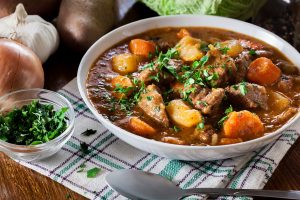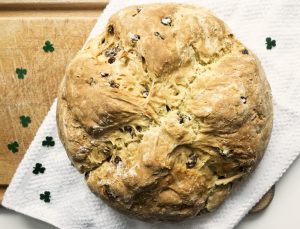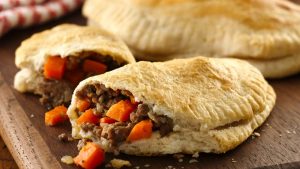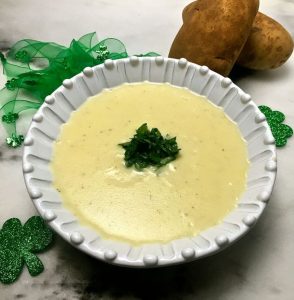5 Traditional Irish Dishes & Their History
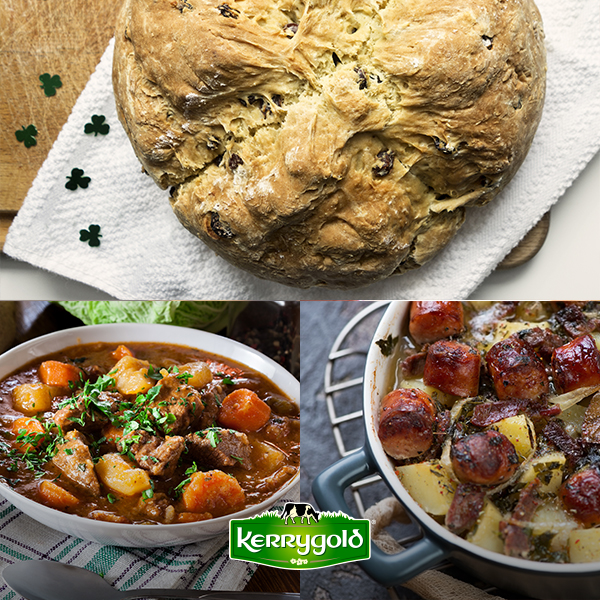
Food is a very important part of our culture and heritage. For many individuals, food is at the core of their heritage and forms a fundamental part of their upbringing.
One of the best ways to learn about a culture and their people is to eat a meal with them.
While many people may believe that Irish food is based on nothing more than potatoes and mutton, there is much more to Irish traditional food than that.
Today we are going to explore five traditional Irish dishes that form a large part of Irish tradition even today.
Irish Beef Stew
Stew is hands-down one of the favourite winter warmers in any culture. The beauty of this is that there are hundreds of different types of stews that are unique to each country and culture.
Irish Beef Stew is the traditional stewing dish in Ireland. Today some Irish add Guinness beer to the recipe to make the meat more tender and succulent.
Interestingly, while the modern version of the stew is usually made with beef the earlier versions were made with mutton. During earlier times, mutton was easier to come by than beef.
Irish Soda Bread
Bread is a staple part of every culture and, the same as with the stew, there are hundreds of different bread recipes all across the world.
Traditional Irish Soda Bread is made with only four ingredients: flour, baking soda, soured milk and salt. The reason for this is that many families in Ireland were unable to afford more than this. As a result, Irish Soda Bread became a staple part of the Irish diet.
Modern recipes do contain more ingredients and variations but if you want to go traditional then the four-ingredient Irish Soda bread is the way to go.
Interesting fact: the traditional Irish Soda Bread had a cross on top of it. The legend behind the cross was to rid the devil while the bread baked for good luck!
Beef and Veggie Hand Pies
Beef and Veggie hand pies with savoury meat and potato filling can be traced back to early Irish times. Of course, in modern times, it is much easier to use pre-made dough but back in the day the dough was made with a different purpose.
In modern times the dough and the filling is eaten but in early Ireland the dough was used to preserve the filling to be eaten at a later stage.
These first pies were actually called “coffins” or “coffyns” and loosely refer back to ancient Egypt. The dough was solely used to preserve the filling on the inside and was too hard to eat.
Image credit: fivestarhomefoods.com
Irish Potato Soup
It is no secret that the Irish are big lovers of potatoes and dishes made from potato which is why this Irish Potato Soup falls perfectly into the traditional food category.
While potatoes have become synonymous with Ireland and Irish dishes, the vegetable did not originate from there. In fact, potatoes were discovered by Spanish conquistadors in the Andes Mountains and were only brought to Europe in the 1500s.
Interestingly, potatoes only arrived in Ireland in the mid-to-late 16th century. The cool and damp Irish climate and soil conditions were perfect for cultivating potatoes, a small plot could yield a large crop and potatoes could be enjoyed by both people and animals alike.
As a result, potatoes became a staple Irish food product and remain so today.
Image credit: fivestarhomefoods.com
Dublin Coddle
Pigs are the oldest domesticated animals in Ireland which is why its presence is wide-spread in Irish food and cooking ranging from sausages, bacon and gammon.
Bangers, along with any other bovine-based meat, were highly popular in Ireland during early times which is why many of the Irish traditional meals were pork-based.
Dublin Coddle is a slow-cooked traditional dish made with potatoes, onions, bacon and bangers. Traditional Dublin Coddle was boiled together in one pot.
Interestingly, Dublin Coddle become a popular Irish dish among housewives in the 1700s as they were able to make it before they went to bed and allowed it to simmer on the stove.
When their husbands arrived, the food would still be warm from simmering on the stove for hours!
***
What traditional Irish dishes do you love? Do you know the history behind these dishes? Share your thoughts in the comments on our Kerrygold Facebook, Twitter or Instagram pages.
